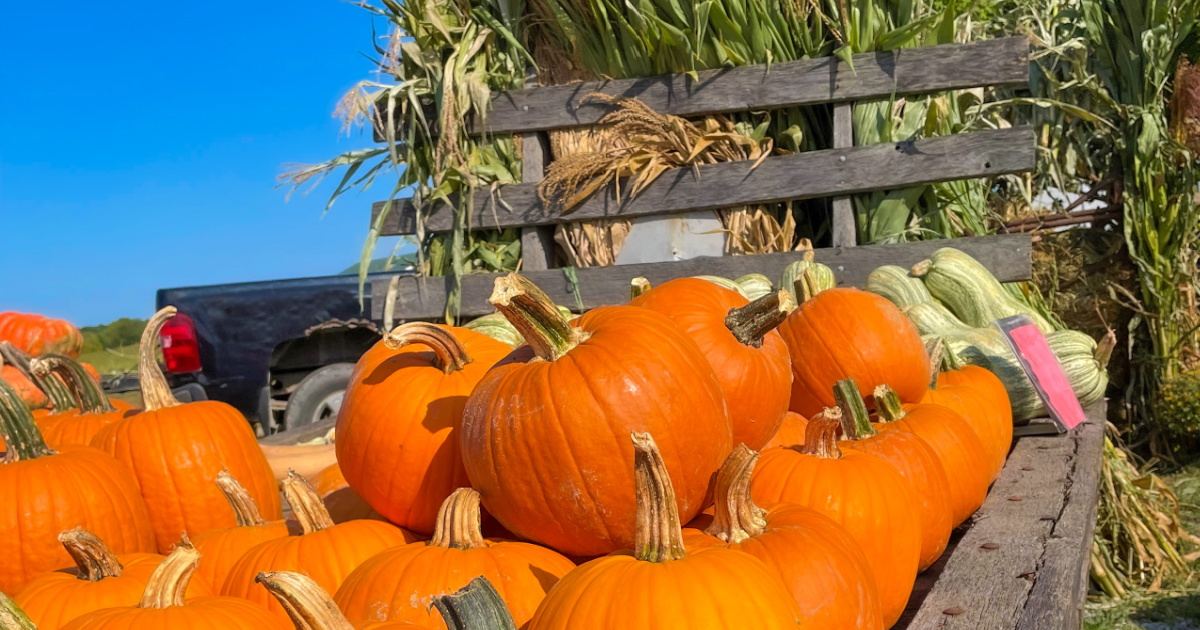Pumpkins Finding Their Place on the Farm
Posted on Oct 3, 2024This fall favorite is becoming more popular with Kentucky farm families.
By Kentucky Farm Bureau News Staff
EDMONTON, Ky. – There aren’t too many things that indicate fall has arrived more than the sight of pumpkins at nearly every retail food store, in farmers’ markets, and through direct farm sales. And while this state may be better known for corn, soybeans, and tobacco from a crop perspective, pumpkins are proving to be an important addition to the farm.
Brandon Bell, the University of Kentucky Martin-Gatton College of Agriculture, Food and Environment (UKMGCA) Agriculture and Natural Resources extension agent in Metcalfe County has worked with pumpkins for many years and helps other growers get started in what is becoming a lucrative business.
“I started growing pumpkins in the mid-nineties and have grown them for about 30 years,” he said. “I became an extension agent 20 years ago and have been able to take what I've learned from being a grower over those years and apply that along with UK's research.”
Bell not only works with growers in his county but surrounding areas and across the state, helping them succeed in their pumpkin-growing efforts.
“I feel like production is continuing to increase and there are a lot of people getting into it,” he said. “Some are doing strictly wholesale, and others are doing retail. There are also many roadside markets, and agritourism venues that sell pumpkins.”
However growers are selling their pumpkins, Bell said there's been a good market over the past several years as more people are setting up stands and inviting people to their farms.
Kentucky Agriculture Commissioner Jonathan Shell, a pumpkin grower himself, said the industry has the ability to expand in this state.
“We're not a big pumpkin state right now, but there's no question that we can grow more, and we are in a perfect location to sell more to southern states,” he said. “Building that market out will be a challenge for some but we can be a pumpkin state.”
Bell agreed saying it can also be a very money-making crop.
“We have some challenges because of our humidity, and we have some disease pressure, but we can definitely grow a good crop of pumpkins here and it can be very profitable based on the yield that we can get,” he said. “Once you get much further south from here, it gets kind of difficult to grow them, but that puts us at an advantage because a lot of our pumpkins here go south.”
UK research efforts have increased helping producers combat the challenges associated with pumpkin production as the number of producers continues to grow.
“There's been new interest in research and the university is looking into things like disease management and there have been more trials lately,” Bell said. “I think people are beginning to realize how important pumpkin production could be to Kentucky's ag industry and are going to continue to start looking into the crop more as far as research is concerned.”
In addition to more research efforts, much of the growth of this specialty crop can be associated with Kentucky’s bustling agritourism industry bringing non-farmers to the farm.
“Pumpkins and corn mazes in the fall are agriculture's best tool for getting people who are non-farm on the farm,” Shell said. “And it's a huge opportunity that we have in this state to educate non-farm residents about what a farm looks like.”
His pumpkin crop goes along with a diverse operation that includes cattle, hay, row crops, corn for silage, and on-farm greenhouses.
“We had about 25 acres of pumpkins this year and that has fit in well as far as diversifying our operation,” Shell said. “And while growing pumpkins isn’t easy, it’s one of my favorite things to do on the farm. It’s fun because pumpkins make people happy.”
As Kentucky agriculture moves further and further from what was once an industry dominated by tobacco, farm families have continued to look for new or different crops on the farm and pumpkins have become another tool in their farming toolbox.
“They're not only one more opportunity for our farm families, but I think they're one of the best opportunities,” Bell said. “I've looked into a lot of things and people have tried a lot of things to replace tobacco. I think pumpkins come closer to replacing tobacco than anything out there.”
Permission is granted to reprint this article in its entirety in both print and online formats. Credit to: Kentucky Farm Bureau News.

Comments